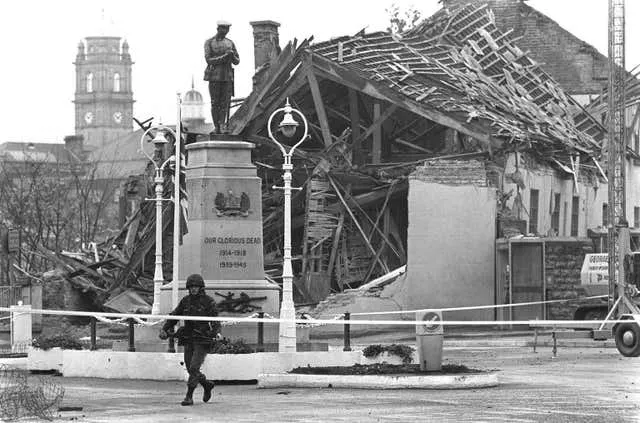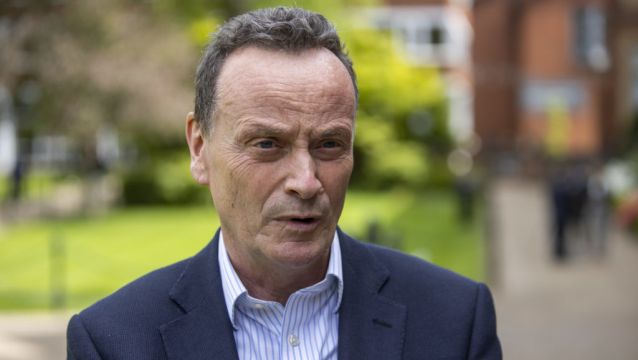Future generations will inherit the trauma of Northern Ireland’s troubled past if politicians do not address legacy issues, the victims’ commissioner has warned.
Ian Jeffers will leave the role on January 5th after almost two years, and without a Stormont Executive in place there is uncertainty over whether a successor can be appointed.
One of Mr Jeffers’ final moves in office was a proposal for bereavement payments to relatives of all of those killed during the Troubles.
The proposed scheme would deliver one-off payments of £10,000 to the families of all the bereaved, including those who were involved in paramilitary groups.
More than 3,000 people were killed in the conflict from the late 1960s to the late 1990s.

In the paper to the Executive Office, Mr Jeffers said the move “will be contentious”, acknowledging some “will find it difficult to accept the idea that all bereaved families should be included”.
But he said he sees the value of a “recognition payment to those suggested in this paper in promoting reconciliation”.
In an interview with the PA news agency, Mr Jeffers said while there has been a payment scheme for those injured in the Troubles, the bereaved have never been formally acknowledged.
He said they have published advice to Government around a scheme for the bereaved, which he described as “critical”.
“We haven’t really as a society formally acknowledged those that have been bereaved, particularly siblings as well,” he said.
“Nothing can really happen with it until we’ve got a devolved government in place, but there is, without doubt, the right attitude within our elected representatives to try and do something.”
Mr Jeffers said during the marking of the 25th anniversary of the Belfast/Good Friday Agreement in 2023 the voice of the victim was “hard to find”.
“We still have to address the legacy issues, and the (legacy) Bill isn’t the way to do that … we still need a broader societal debate about legacy,” he said.
Useful evidence session @CommonsNIAC highlighted the need to improve communication and streamline the victim payment scheme. Also encouraged them to write to @chhcalling to request removal of backdating deadline. pic.twitter.com/WCELpOVhpp
— Ian Jeffers (@IBJeffers) December 4, 2023
Advertisement
“We’ve got to remember that if we don’t address the past, children, grandchildren, will inherit a lot of it, and they will understandably feel a need to try and make some sort of resolve for their family, in trying to get either justice or knowledge or acknowledgement for their family.”
Mr Jeffers was appointed victims’ commissioner in February 2022 after the post had been vacant for more than two years.
He said there was a lot of work to connect with the wide variety of voluntary groups which advocate for and support victims, included 40 funded organisations.
But he said the groups represent “only a proportionately small number of victims and survivors”.
He said a commission survey found that 24 per cent of the population in Northern Ireland could identify as victims, but he said those that could identify and do identify are two different groups.
In the Republic of Ireland, he said almost 10 per cent could identify as a victim or survivor.
“The groups themselves support in the region of 15,000 victims and survivors, and you’re at least three times that figure in terms of those with significant challenges as a result of the Troubles.
“So from that point of view, there are many many people out there that clearly identify as victims and survivors, but I would stress there are many many thousands that don’t want to (identify as victims and survivors). They don’t want to be labelled as a victim because they feel that that holds them back or restricts them in some way.
“There’s still a large number of people (in the Republic of Ireland and Great Britain) that have no specialist support and that’s something we would like to see.
“The Republic has had attempts at it but it largely continues to sort of say, ‘well, that’s in the past, let’s forget about it’. And that’s not an appropriate way to address the legacy of the past. We’ve got to support victims and survivors as part of a broader reconciliation process.”
As Mr Jeffers prepares to leave the role of commissioner, he said appointing a successor must be prioritised.
While a new commissioner cannot be appointed in the absence of a functioning Stormont Assembly, he called for the Executive Office to start the process and be ready to present future ministers with recommendations.
Mr Jeffers said that in the absence of a commissioner, the Victims’ Forum, with 10 new forum members appointed in December, will be the “critical mouthpiece of the commission”.
“These are people with lived experience, and we’ve seen throughout my tenure that having victims and survivors there from different backgrounds, different communities, different sorts of victimhoods, significantly strengthens our argument,” he said.
He described his departure to become the new chief executive at Co-operation Ireland was “not planned” but that he regarded the role as “once-in-a-lifetime”.
“Although my time as commissioner has been relatively short I would like to think I’ve done a significant amount of lobbying campaigning for victims and survivors, and I’ll continue to do that in the new role because I’ve learned over the short period of time the importance of making sure that victims, survivors, from all our communities have a voice,” he added.







